| | | | | | | | | | | Axios World | | By Dave Lawler ·Jul 19, 2021 | | Welcome back to Axios World. - Thanks as always for joining us. We're starting tonight with the global debate around vaccine boosters (1,780 words, 6½ minutes).
Subscribe here, and tell a friend. | | | | | | 1 big thing: Vaccine boosters for the rich |  | | | Illustration: Aïda Amer/Axios | | | | The rapid spread of the Delta variant around the rich world has injected increased urgency into the debate around booster shots, but the World Health Organization and public health experts are trying to keep the focus on getting vaccines to those who don't yet have access. Why it matters: Israel last week became the first country to offer boosters to people with weak immune systems, and Pfizer is pushing for rapid approval of boosters in the U.S., citing preliminary data that suggests immunity may begin to wane after six months. Yes, but: Those findings conflict with other data, and scientists and regulators say it's too early to know whether boosters will be needed. - Still, wealthy countries like the U.S., U.K. and South Korea have already placed bulk orders to hedge against the need for boosters. Countries that might otherwise donate surplus doses also have an incentive to hold onto them.
- "I think we're definitely moving toward boosters being deployed across most high-income countries for some high-risk populations over the next three to six months," says Krishna Udayakumar, director of Duke University's Global Health Innovation Center.
But the debate around boosters in rich countries is happening with just a fraction of people in the developing world having had a single shot, including just 3% across Africa. - WHO director-general Tedros Adhanom Ghebreyesus has accused companies like Pfizer and Moderna — which stand to profit more from boosters for rich countries than first doses for poorer ones — of "making conscious choices right now not to protect those in most need."
- Warning against a "two-track pandemic," he urged companies and countries to share doses with the COVAX facility rather than save them for boosters.
- The WHO's chief scientist, Soumya Swaminathan, has said there's no evidence that booster shots will be needed before "a year or two years," if at all.
Even if immunity does wane over time, people who are vaccinated will still have some protection, meaning it's far more urgent from a global health standpoint to vaccinate those who haven't had a shot yet — particularly health care workers and vulnerable people in lower-income countries. - But even world leaders who frequently cite the need for "equitable access" to vaccines have consistently prioritized protecting their own populations.
New Zealand Prime Minister Jacinda Ardern hedged at a virtual press conference this week when I asked whether it would be wrong for rich countries to give boosters while access remained so uneven. - She said the imperative was to increase immunity so as to reduce the risk from variants, and countries would have to make their own decisions as to the role of boosters.
State of play: In the long term, the cash that countries and companies are pouring into the development of booster shots could ensure a greater overall supply, Udayakumar says. - For now, particularly in the next three months while supply remains tight, it's yet another hurdle for low- and middle-income countries struggling for access, he says.
|     | | | | | | 2. U.K.'s awkward "Freedom Day" | 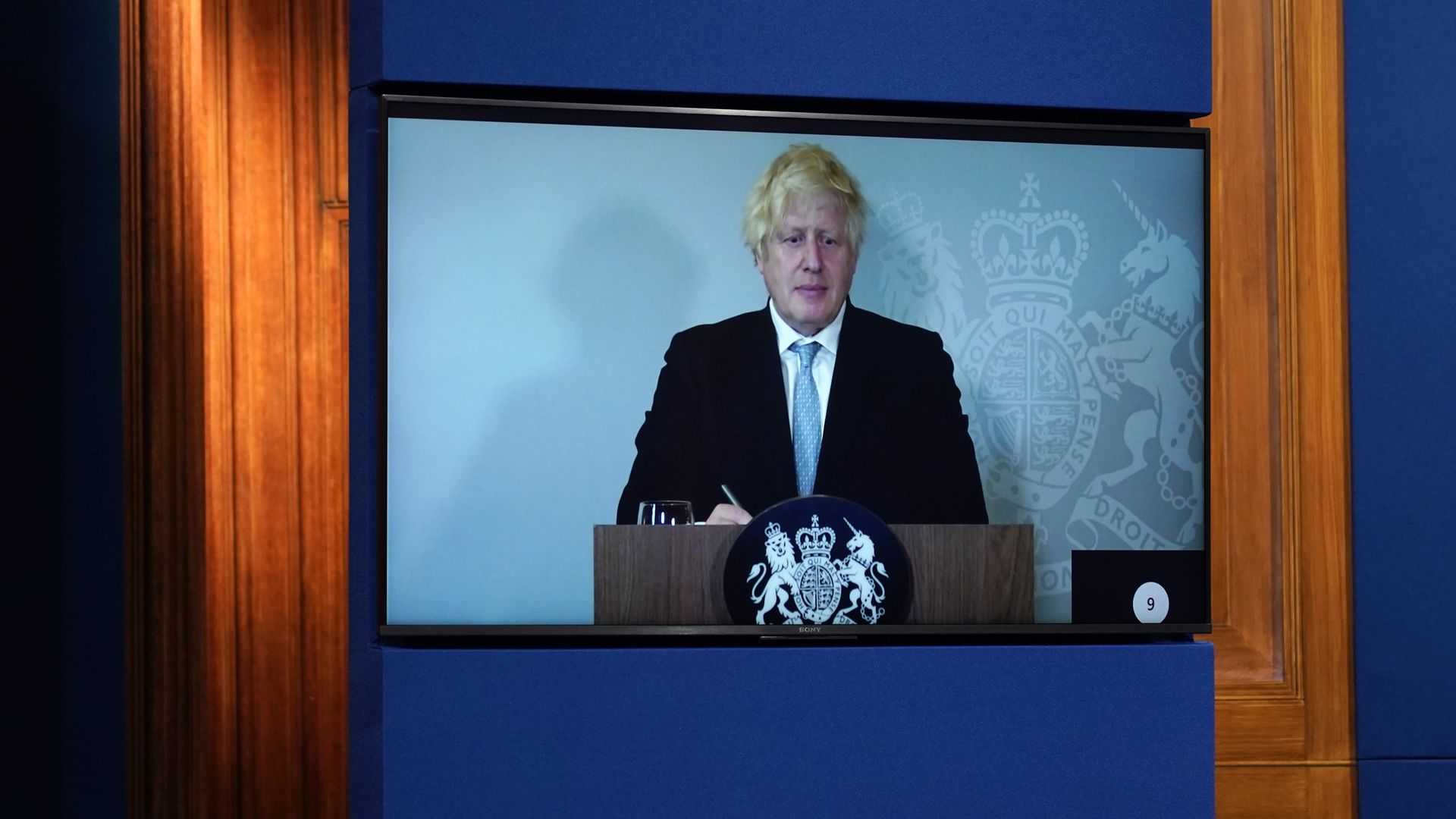 | | | We're all free! Well, except for me. Photo: Alberto Pezzali/WPA Pool/Getty | | | | The U.K. lifted all coronavirus restrictions today, but "Freedom Day" felt odd for at least two reasons: the U.K. has the world's highest population-adjusted rate of new cases (aside from small island countries), and the prime minister who set the policy is currently self-isolating. State of play: The exponential growth in cases, powered by the Delta variant, has not yet been matched by a similar spike in cases, likely because of the U.K.'s high vaccination rate (87% of adults have had one shot). - But among those infected was Health Secretary Sajid Javid, who had been vaccinated ("breakthrough cases" aren't uncommon but don't tend to result in serious illness).
- That led to Prime Minister Boris Johnson being pinged by a test-and-trace app and told to isolate because of his contact with Javid. Johnson initially said he was instead going to take part in a pilot program where he'd be tested daily, but then reversed course under pressure and said he'd self-isolate for 10 days.
- Hundreds of thousands of Brits have received similar notifications, leading to staff shortages at hospitals and businesses, cancellations of theater performances, and the closure of some stores.
More headlines: - Netherlands Prime Minister Mark Rutte has apologized after having to quickly reverse the lifting of coronavirus restrictions after a massive surge in cases.
- As cases spike in Tunisia, other Arab countries like Saudi Arabia, the UAE and Algeria are stepping up with aid and vaccines in an apparent play for influence, the Washington Post reports.
- Positive tests are coming in from the Tokyo Olympics.
- Fully vaccinated Americans will soon be able to visit Canada.
|     | | | | | | 3. French will have to get vaccine to do just about anything |  | | | Protests in Marseille against the new policies. Photo: Gerard Bottino/SOPA Images/LightRocket via Getty | | | | France has seen a surge in vaccinations and a groundswell of anger over policies that will next month make it mandatory to get the shot or show a negative test in order to visit a cafe, see a movie, take a train and more. - As a further incentive to get vaccinated, tests will no longer be free. In addition, staff at hospitals and nursing homes won't be paid if they're not vaccinated by September.
Driving the news: Protests across the country reportedly drew over 100,000 people over the weekend, and two vaccination centers were vandalized. State of play: Despite one of the world's most vaccine-skeptical populations, France has nearly caught up to the U.S. on vaccinations. The new policy is aimed in particular at younger people who might otherwise opt out. - It's working. Vaccination centers have been full ever since Macron's announcement. And initial polls suggest two-thirds of people support the measures.
- What to watch: The policy puts the onus on restaurant owners, who will now have to turn away customers who decline to show a valid "health pass," or risk a fine or even jail time.
The big picture: Several countries have mandated vaccines for certain health workers or attempted some form of "vaccine passport," but Turkmenistan recently became the second country to make them mandatory for all adults, following Indonesia. |     | | | | | | A message from Axios | | Market news worthy of your time | | | 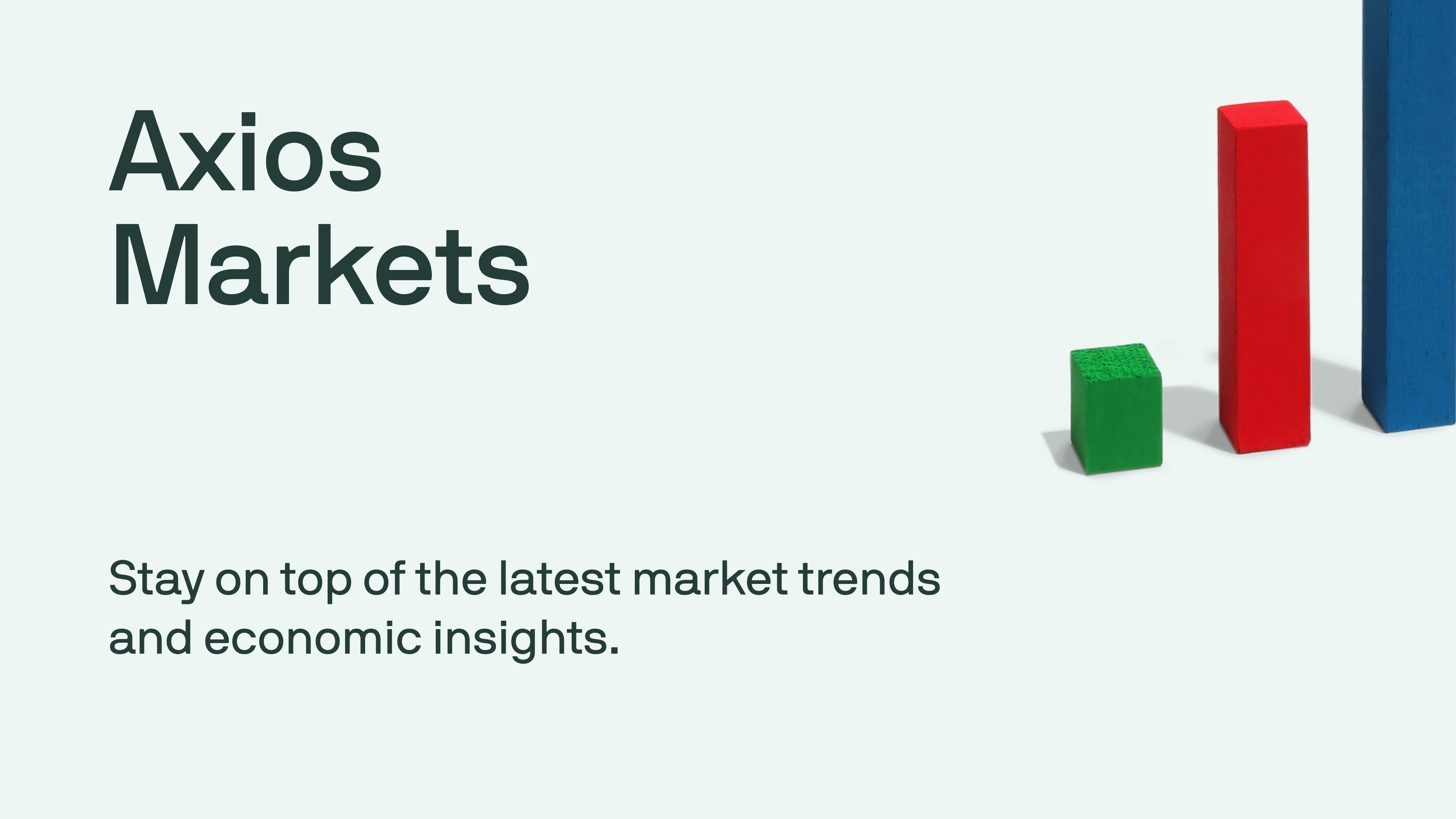 | | | | Get a daily look at the news and trends dominating the worlds of global business and finance. Why it matters: We highlight the stories that matter and share crucial economic insights. Stay informed in just a few short minutes. Subscribe for free | | | | | | 4. The pandemic's new hot zone | 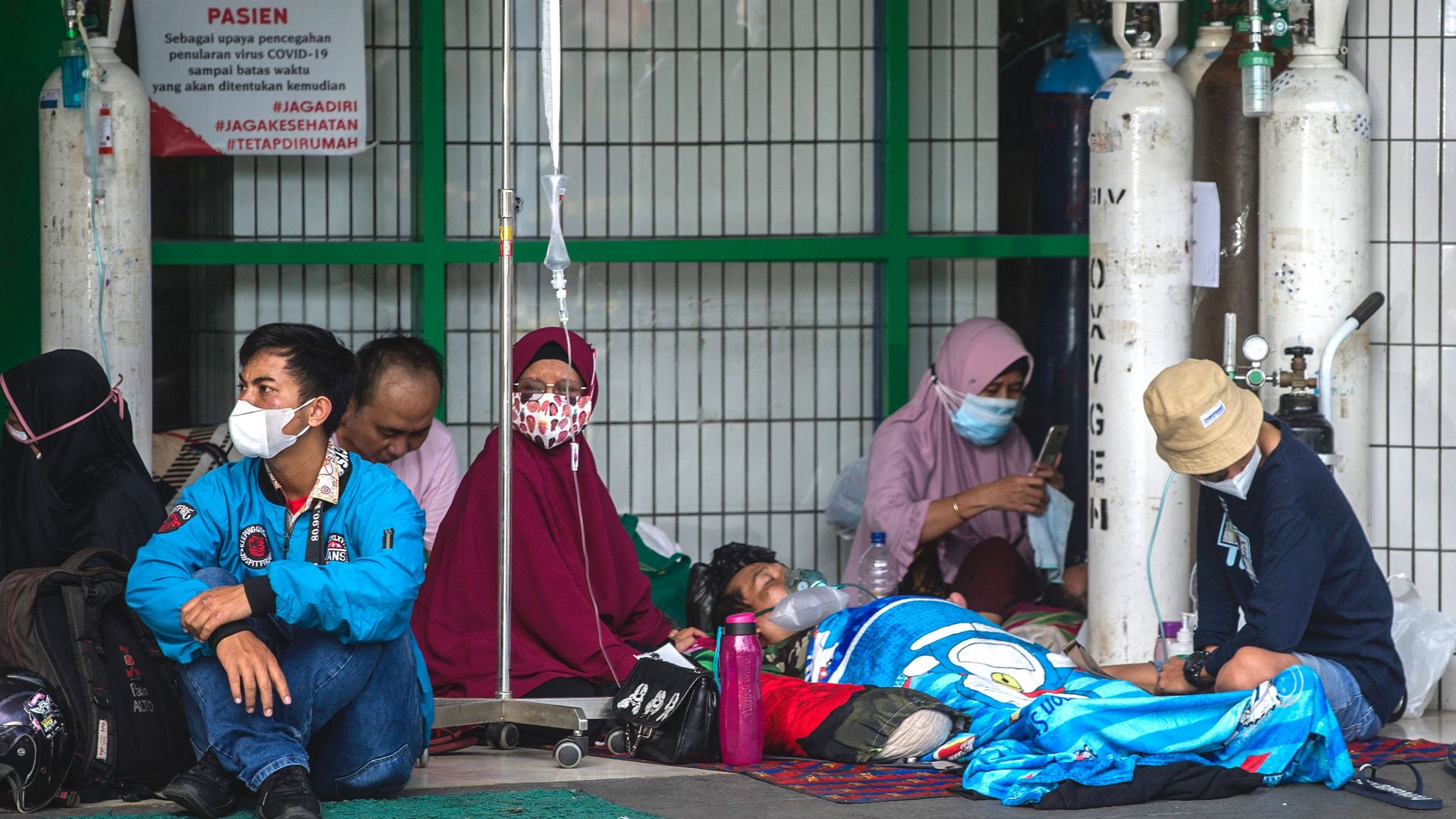 | | | Waiting to be administered to the hospital in Surabaya, Indonesia. Photo: Juni Kriswanto/AFP via Getty | | | | Indonesia is now recording more cases each day than any other country as the Delta variant sweeps through Southeast Asia. The big picture: Earlier waves of the pandemic largely missed countries like Thailand, Myanmar and Vietnam. But with vaccination rates still low, countries in the region are now recording their highest case counts of the pandemic. Zoom in: Just 6% of Indonesians are fully vaccinated (15% have had one dose), and many of them received the Chinese-made Sinovac vaccine, which has a relatively low efficacy rate. - At least 30 health care workers who received Sinovac died of COVID-19, leading the government to announce that up to one-third of the 4.5 million Moderna doses donated by the U.S. would be prioritized as booster shots for health care workers.
What's next: Indonesia, Malaysia and the Philippines all initially relied on Chinese-made vaccines but have purchased Pfizer or Moderna and are expecting large shipments soon. - That's part of a shift toward Western vaccines in the developing world as supply of the more effective vaccines starts to become available, WSJ reports.
|     | | | | | | Bonus: Where in the World? | 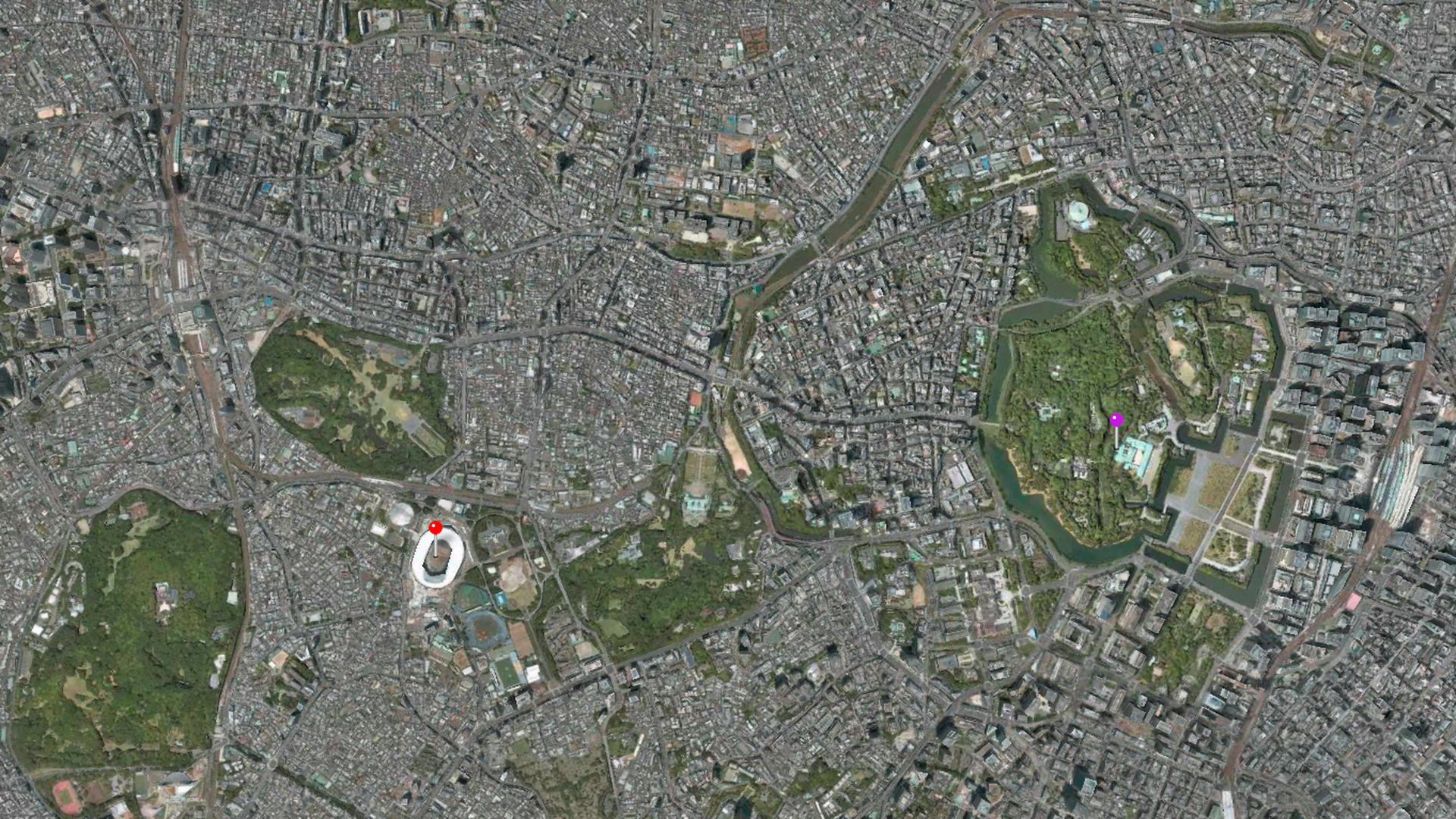 | | | Screengrab via Apple Maps | | | | We're visiting one of five cities to host the Summer Olympics multiple times. We'll start with a palace tour (purple pin) and then head to the National Stadium (red pin), the main Olympic venue. Can you name the city, and the four others? Scroll to the bottom for the answer. |     | | | | | | 5. Global news roundup | 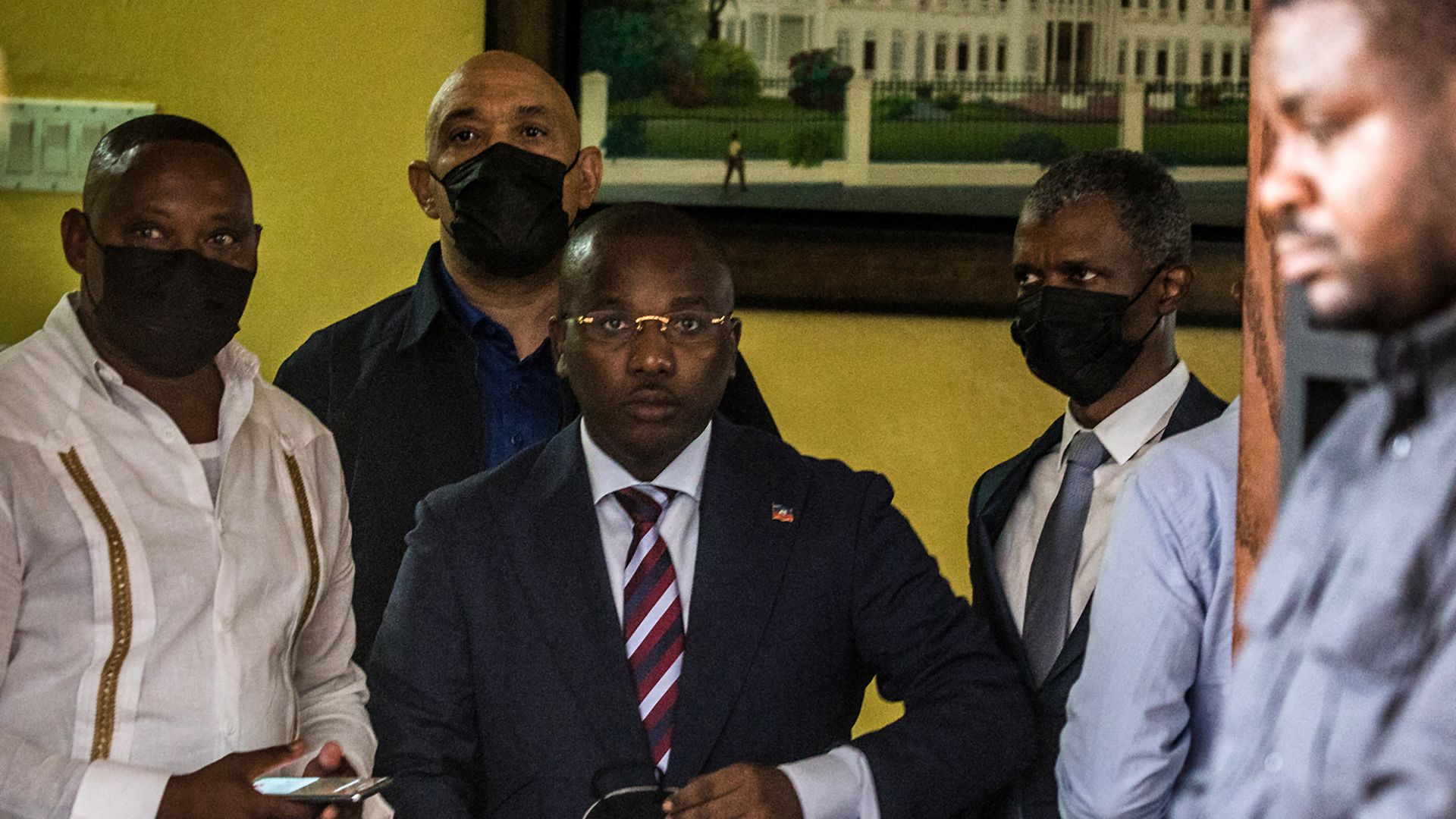 | | | Claude Joseph (C) is stepping aside in Haiti. Photo: Alerie Baerisyl/AFP via Getty | | | | 1. Haiti's acting Prime Minister Claude Joseph is stepping down in favor of the man President Jovenel Moïse had picked to replace him two days before being assassinated, Joseph told the Washington Post today. - Why it matters: The ascension of Ariel Henry — who was in political limbo as he had never been sworn in as prime minister — ends a potential power struggle between the two. It came after diplomats from the U.S. and several other countries publicly backed Henry's claim to the post.
2. Governments are using spyware from Israeli firm NSO, originally designed to track terrorists and criminals, to hack smartphones belonging to journalists and activists, an international journalism consortium reports. - Clients of NSO include Azerbaijan, Bahrain, Hungary, India, Kazakhstan, Mexico, Morocco, Rwanda, Saudi Arabia and the UAE, per the report.
3. Afghanistan is pulling its diplomats out of Pakistan after its ambassador's daughter was kidnapped and tortured in Islamabad, according to the Afghan Foreign Ministry. She was later released. 4. Russia has embraced the junta in Myanmar in the wake of February's coup, convening high-level meetings, discussing arms sales and proving once again that a pariah to the West is a friend to Moscow. - "Russia's position stands in contrast with China, Myanmar's neighbor, biggest investor and long-term backer, which has kept its distance and expressed concern about stability since the February coup," WSJ's Brett Forrest writes.
5. More than 1 million people each day in Cuba are using an anti-censorship tool supported by the U.S. government to circumvent their own government's social media blackouts. |     | | | | | | 6. Coming attractions: 10 weeks until Germany votes |  | | | The Laschet (C) laugh. Photo: Marius Becker/POOL/AFP via Getty | | | | After winning the race to become Angela Merkel's heir apparent as leader of Germany's center-right Christian Democrats (CDU), Armin Laschet has had his share of struggles. The big picture: The governor of Germany's largest state, North-Rhine Westphalia, Laschet is a centrist in the Merkel mold, but lacks her popularity, as has been confirmed by polls ahead of September's election. - His place on the ballot was threatened in April by an unusual challenge from the leader of the CDU's sister party, though Laschet ultimately limped across the finish line to become the conservative candidate for chancellor.
- Since then, things have started to look up. The CDU won a regional election last month, and a poll last week showed the party 11 points ahead of the second-place Greens, up from a dead heat in May.
Then came the floods that have left over 160 Germans dead — and Laschet's biggest blunder yet. - As Germany's president gave a somber statement in a hard-hit town, Laschet was caught laughing and seeming to share a joke in the background.
- Opposition politicians have seized on the footage as evidence that Laschet isn't up for the top job.
|     | | | | | | 7. Stories we're watching | 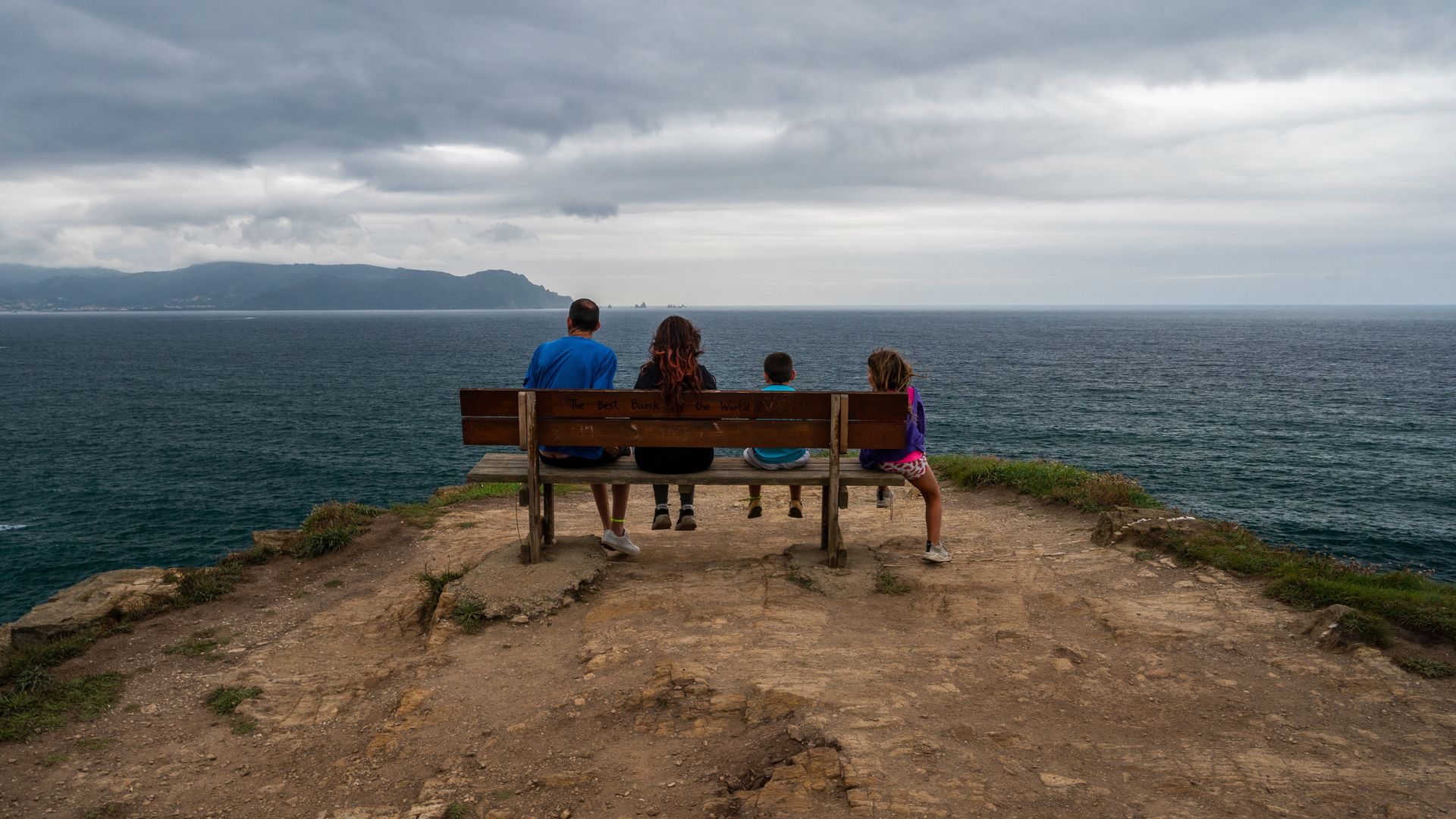 | | | A family on a bench in Galicia, Spain. Photo: Marcos del Mazo/LightRocket via Getty Images) | | | - Biden transfers first Guantanamo detainee out
- Afghan talks resume, Iran talks paused, Biden to meet Iraqi PM
- "Havana syndrome" in Vienna
- Greenland suspends oil exploration due to climate change
- Egypt releases journalists, activists after U.S. expresses concerns
- Biden picks ambassadors to U.K. and New Zealand
- Pulitzer-winning Reuters photojournalist killed in Afghanistan
Quoted: "President Moon is engaged in a tug of war with only himself." — A Japanese diplomat labeling a planned visit by South Korea's president ahead of the Olympics as "masturbating" because Japan didn't have time to worry about relations with South Korea at the moment. Moon canceled the visit over the remark. |     | | | | | | A message from Axios | | Market news worthy of your time | | |  | | | | Get a daily look at the news and trends dominating the worlds of global business and finance. Why it matters: We highlight the stories that matter and share crucial economic insights. Stay informed in just a few short minutes. Subscribe for free | | | | Answer: Tokyo. Other repeat hosts: Athens (1896, 2004); Paris (1900, 1924, 2024); London (1908, 1948, 2012); Los Angeles (1932, 1984, 2028). |  | | It'll help you deliver employee communications more effectively. | | | | | | Axios thanks our partners for supporting our newsletters. If you're interested in advertising, learn more here.
Sponsorship has no influence on editorial content. Axios, 3100 Clarendon Blvd, Suite 1300, Arlington VA 22201 | | | You received this email because you signed up for newsletters from Axios.
Change your preferences or unsubscribe here. | | | Was this email forwarded to you?
Sign up now to get Axios in your inbox. | | | | Follow Axios on social media:    | | | | | |












No comments:
Post a Comment